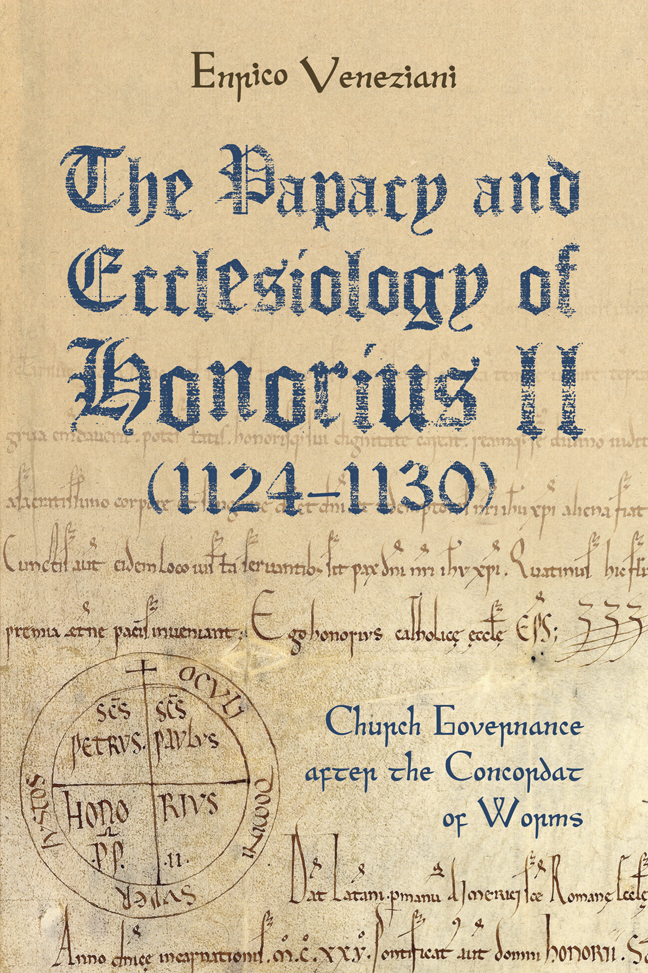 The Papacy and Ecclesiology of Honorius II (1124-1130)
The Papacy and Ecclesiology of Honorius II (1124-1130) Book contents
- Frontmatter
- Dedication
- Contents
- List of Illustrations
- Acknowledgements
- List of Abbreviations
- Introduction
- 1 Honorius II and Roman primacy: continuities and innovations
- 2 The instruments used to assert Roman primacy
- 3 Honorius's deafening silences: his relations with lay powers
- 4 Ecclesiology at work: a case study of Montecassino
- Conclusion
- Appendix: A preliminary calendar of the letters of Honorius II
- Bibliography
- Index
- Studies in the History of Medieval Religion
3 - Honorius's deafening silences: his relations with lay powers
Published online by Cambridge University Press: 09 January 2024
- Frontmatter
- Dedication
- Contents
- List of Illustrations
- Acknowledgements
- List of Abbreviations
- Introduction
- 1 Honorius II and Roman primacy: continuities and innovations
- 2 The instruments used to assert Roman primacy
- 3 Honorius's deafening silences: his relations with lay powers
- 4 Ecclesiology at work: a case study of Montecassino
- Conclusion
- Appendix: A preliminary calendar of the letters of Honorius II
- Bibliography
- Index
- Studies in the History of Medieval Religion
Summary
Honorius II's pontificate was during a period of intense change which also affected secular powers. His chancery adopted several strategies to interact with these new realities, which ranged from the emerging of the communes, through the slow strengthening of the monarchies in France and England, the creation of courts, and the growing importance of bureaucracy, to the end of the Salian dynasty with the death of Emperor Henry V in 1125, and the rise of Roger II as a result of the creation of the kingdom of Sicily by Anacletus II in 1130. This chapter focuses on these lay powers, their position in the world according to the papal chancery, and the ecclesiological elements that played a role in the pope's relations with them. It also considers whether the fact that this was the first papacy after the Concordat of Worms (1122) affected the way Honorius dealt with lay powers, and particularly with the Empire.
There is of course a significant factor in this analysis which might affect our understanding of these relations and that is the scarcity of extant letters from the papal chancery. But while chance certainly played some part in the loss of official Roman sources, this is not the only explanation for the lack of documentation. In some cases, there may have been a process of selective repression of letters by Honorius's successors as the epistles might have had an unwelcome impact on their papacies (for example, in the case of relations with the Normans). Indeed, Nicolangelo D’Acunto has recently suggested that a similar procedure affected the archives of several ecclesiastical institutions at the end of the Investiture Contest, when embarrassing documents may have been removed.
This is why I have entitled this chapter ‘Honorius's deafening silences’, which is intended as a provocation. This may seem a dangerous approach to adopt, given that the silence may not have been an intentional choice, but the disproportionate number of documents issued to ecclesiastical institutions as against the few to lay powers makes it impossible to dismiss this as a problem of surviving sources; there is something more to investigate. This approach to Honorius's papacy, besides offering a new interpretation of some of the letters, will enhance the understanding of the gap as being significant in itself when recreating the pope's ecclesiology towards lay institutions.
- Type
- Chapter
- Information
- The Papacy and Ecclesiology of Honorius II (1124-1130)Church Governance after the Concordat of Worms, pp. 125 - 160Publisher: Boydell & BrewerPrint publication year: 2023


